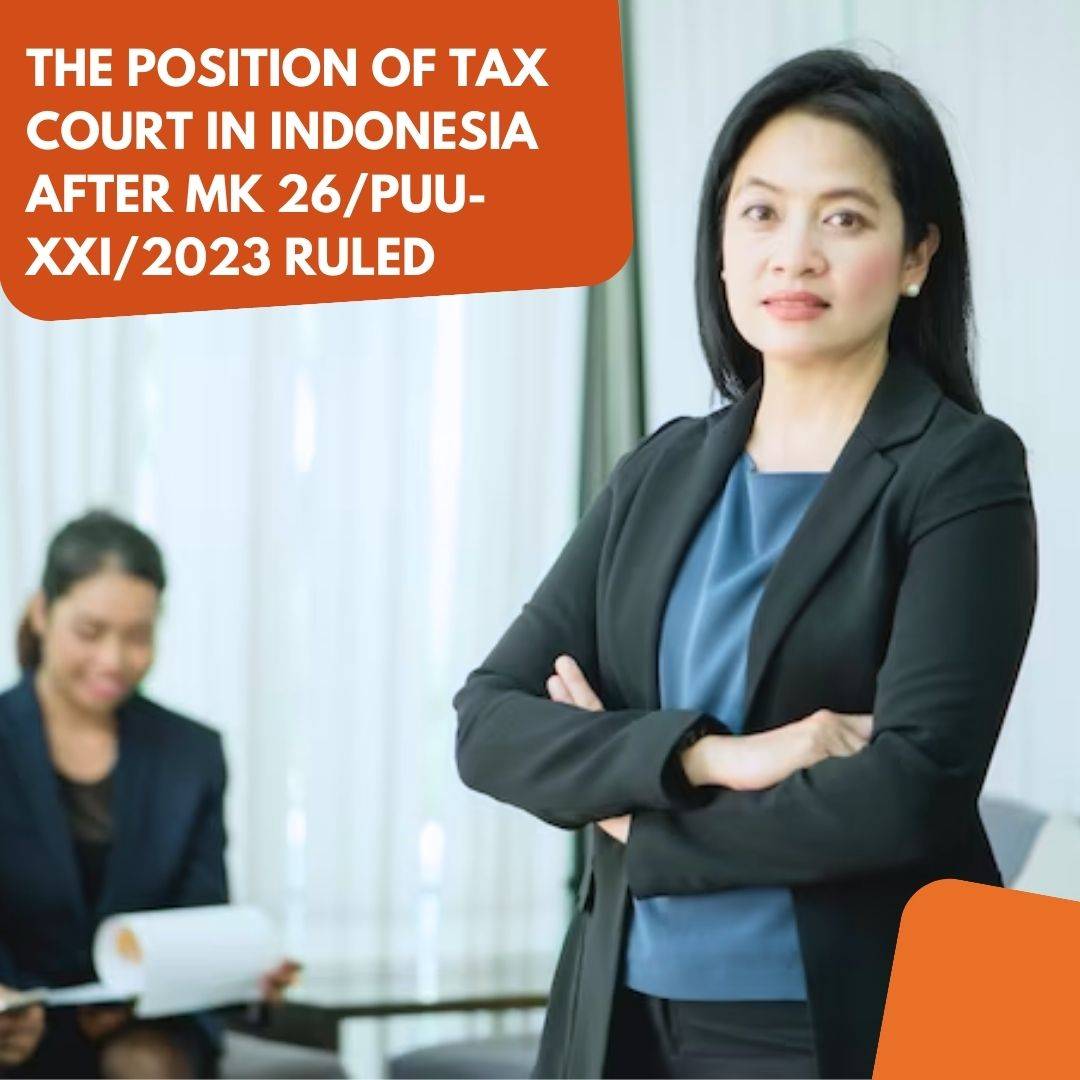The Position of the Tax Court in Indonesia After the Ruling of MK 26/PUU-XXI/2023
On May 25th, the Chairman of the Constitutional Court, Anwar Usman, announced the Decision of the Constitutional Court Number 26/PUU-XXI/2023. The decision stated the transfer of the oversight of the Tax Court from the Ministry of Finance (Kemenkeu) to the Supreme Court (MA). Speaking about this matter, TGS AU Partners team will discuss about the position of the Tax Court following the issuance of the Constitutional Court decision.
Issuance Background of MK 26/PUU-XXI/2023
The decision MK 26/2023 was issued based on a petition submitted by Nurhidayat, a tax litigation specialist lawyer; Allan Fatchan Gani Wardhana, a lecturer; and Yuniar Riza Hakiki, the Secretary-General of the Center for Constitutional Law Studies (PSHK) at the Islamic University of Indonesia (UII). In their petition, they’re argued that Article 5 Paragraph (2) of Law Number 14 of 2002 concerning the Tax Court contradictive the 1945 Constitution (UUD 1945).
In response to the petition, the Constitutional Court provided a decision stating that the phrase "Department of Finance" in Article 5 Paragraph (2) of Law Number 14 of 2002 concerning the Tax Court (State Gazette of the Republic of Indonesia Number 27 of 2002, additional State Gazette of the Republic of Indonesia Number 4189) contradicts the 1945 Constitution and does not have binding legal force, except when interpreted as "the Supreme Court, which will be gradually implemented no later than December 31, 2026."

As a result of this decision, the supervision of the Tax Court was transferred from the Ministry of Finance (Kemenkeu) to the Supreme Court (MA). Article 5 Paragraph (2) of Law 14 of 2002 now reads, "The supervision of the organization, administration, and finances of the Tax Court shall be carried out by the Supreme Court, which will be gradually implemented no later than December 31, 2026."
About the Tax Court and Its Organizational Structure
The Tax Court is a judiciary that exercises judicial authority for taxpayers or tax collectors seeking justice in tax disputes. Its establishment aims to provide justice in tax matters in Indonesia.
Our Service Recommendations
Previously known as the Tax Consideration Board (MPP) and later renamed as the Tax Dispute Settlement Body (BPSP), the institution eventually became the Tax Court with the enactment of Law No. 14 of 2002 as its legal basis.
Structurally, the Tax Court is part of the Administrative Court (PTUN/PTTUN) as a Special Court within the framework of Administrative Justice. The organizational structure of the Tax Court includes its head, judges, secretaries, and clerks. To present the information more comprehensively, here is the organizational structure chart of the Tax Court.
Based on the structure, the head of the Tax Court consists of a Chairman and a maximum of five Vice Chairmen. The leaders are selected from and by the judges of the Tax Court. Currently, there are three Vice Chairmen of the Tax Court, namely:
a. Vice Chairman I of the Tax Court for Non-Judicial Affairs,
b. Vice Chairman II of the Tax Court for Judicial Affairs, and
c. Vice Chairman III of the Tax Court for Judicial Performance Supervision and Development.
The Position of the Tax Court After the Ruling of MK 26
Following the issuance of Decision MK 26/PUU-XXI/2023, the position of the Tax Court is determined in two aspects. First, as a judiciary with judicial authority, and second, as a special court within the framework of Administrative Justice. below is the further explanation.
According to Yuli Aldyanti, SE., ACPA., BKP, who is the Partner Accounting & Tax at TGS AU-Partners, this ruling indirectly relates to the tax legal profession, which could potentially impact requirements and other aspects. Therefore, with the issuance of this Constitutional Court ruling, it is hoped that the derivative rules and their transition can also be completed as soon as possible.
As a Judicial with Authority
Based on Article 24 Paragraph (2) of the 1945 Constitution (Third Amendment), judicial authority is exercised by the Supreme Court and other courts under it, such as General Courts, Religious Courts, Military Courts, Administrative Courts, and the Constitutional Court. As the Tax Court operates within the framework of the Administrative Court (PTUN), it holds a position as a judiciary with judicial authority.
News & Articles Recommendations.
In this regard, the Tax Court has the power to execute judicial authority for taxpayers or tax collectors seeking justice in tax disputes. These tax disputes arise in the field of taxation between taxpayers and competent authorities.
As a Special Court within the Administrative Judiciary
As mentioned earlier, the Tax Court operates within the scope of the Administrative Court (PTUN). This is because the Tax Court is a judiciary that handles tax disputes, where the subjects and objects fall under Administrative Justice disputes.
The Administrative Court (PTUN) can be classified as a special court as it handles specific cases or cases related to specific groups of people. Therefore, the Tax Court also holds a position as a special court due to its differentiation or specialization.
The legal basis for Indonesian Tax Court position in this context can be seen in Article 15 Paragraph (1) of Law No. 4 of 2004, which states that one of the special courts based on the provision is the Tax Court. Similarly, Article 27 Paragraph (2) of Law No. 28 of 2007 on General Provisions and Taxation Procedures (KUP) also mentions that the decisions of the Tax Court are decisions of a special court within the framework of Administrative Justice.
Conclusion
Based on the above discussion, it can be concluded that the oversight of the Tax Court has been transferred to the Supreme Court (MA) from the Ministry of Finance (Kemenkeu) through Decision MK 26/PUU-XXI/2023. After the issuance of this decision, Indonesian Tax Court position is determined in two aspects: as a judiciary with judicial authority and as a special court within the framework of Administrative Justice.
With this transfer, the supervision can be integrated under one judicial institution. The Tax Court can carry out its duties and finances optimally and independently. Consequently, the Tax Court can avoid the possibility of abuse of power or arbitrariness in the government, including neglecting the human rights or constitutional rights of citizens.
News & Articles Recommendations.





